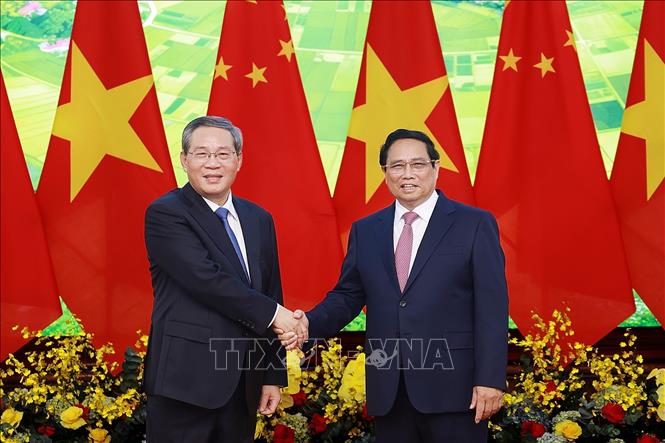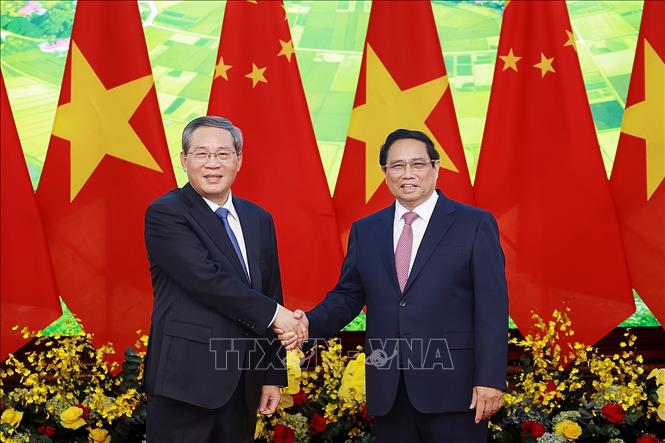FOREIGN RELATION NEWS

Prime Minister Pham Minh Chinh also called for increased cooperation in finance and banking, science and technology, education, culture, tourism, environmental protection, enhanced sharing of meteorological, hydrological, and water resource data for cross-border rivers, and sustainable and efficient management of the Mekong-Lancang River.
In talks on the morning of October 13 at the Government Headquarters, Prime Minister Pham Minh Chinh emphasized that Vietnam always prioritizes strengthening and developing relations with China. He noted that this is a consistent policy, an objective requirement, a strategic choice, and a top priority in Vietnam's foreign policy, according to the Ministry of Foreign Affairs.

Prime Minister Pham Minh Chinh and his Chinese counterpart Li Qiang.
Chinese Premier Li Qiang highlighted that China highly values its relationship with Vietnam, always considering Vietnam a priority in its neighborly diplomacy.
Both prime ministers announced that the Ban Gioc - Detian Waterfall landscape area will officially operate from October 15. This cross-border cooperation zone between the two countries spans 400 hectares, with 200 hectares on each side. Since the pilot operation began on September 15, 2023, about 950 groups, totaling around 12,000 people, have crossed the border for tourism. Prime Minister Pham Minh Chinh urged both sides to expedite the completion of procedures to soon open the Vietnamese Consulate General in Chongqing and further enhance trade cooperation, including expanding market access for high-quality Vietnamese agricultural products such as citrus fruits, pomelos, avocados, custard apples, rose apples, medicinal herbs of plant origin, livestock, poultry, and spiny lobsters.
The Prime Minister also called on China to facilitate the establishment of a Vietnam Trade Promotion Office in Haikou in 2024 and the establishment of similar offices in Chengdu, Sichuan Province, and Nanjing, Jiangsu Province, in the near future.
He urged both sides to enhance customs clearance efficiency at border gates, advance the upgrading of "soft connectivity" with smart customs systems, and collaborate on researching and proposing new models for cross-border economic cooperation between Vietnam and China.
Regarding transportation connectivity, Pham Minh Chinh proposed both sides cooperate in implementing signed agreements on railway cooperation, develop a modern railway industry, provide preferential loans, transfer technology, and support Vietnam in training human resources to operate three standard-gauge railway lines connecting northern Vietnam with China. These include the Lao Cai - Hanoi - Hai Phong line, the Lang Son - Hanoi line, and the Mong Cai - Ha Long - Hai Phong line.
In terms of investment cooperation, the Prime Minister proposed that both sides collaborate on symbolic, large-scale, high-tech projects in areas where China has strengths and Vietnam has demand, such as renewable energy, supporting industries, electric vehicles, international financial centers, free trade zones, smart cities, digital economy, green economy, and circular economy.
Prime Minister Pham Minh Chinh also called for increased cooperation in finance and banking, science and technology, education, culture, tourism, environmental protection, enhanced sharing of meteorological, hydrological, and water resource data for cross-border rivers, and sustainable and efficient management of the Mekong-Lancang River.
He expressed his desire for both sides to effectively implement scholarship programs for Vietnamese students, facilitate the early establishment of a Vietnamese Cultural Center in Beijing, jointly develop a comprehensive plan for the 2025 Vietnam-China People-to-People Exchange Year, and promote a stronger recovery of tourism cooperation. He also requested favorable conditions for Vietnamese airlines to extend and add more flight slots at Chinese airports.
Li Qiang affirmed China's willingness to strengthen the political foundation with Vietnam, deepen cooperation, further open China's market to Vietnamese goods, especially agricultural, aquatic products, and high-quality fruits, and coordinate to facilitate quarantine and customs clearance processes. He expressed China's readiness to work on resolving policy issues.
Li Qiang suggested that both sides strengthen strategic connectivity, particularly in transport infrastructure, and promote cooperation in economic, trade, and investment sectors, especially in manufacturing, agriculture, and maintaining supply chains. He also called for expanded cooperation in vocational training, finance, and monetary sectors.
Li Qiang supported enhancing tourism cooperation, local exchanges, and increasing direct flights between the two countries. Both sides had frank and sincere exchanges on maritime issues, agreeing to strictly implement high-level consensus and the "Agreement on Basic Principles Guiding the Settlement of Maritime Issues between Vietnam and China." They agreed to appropriately manage differences, actively seek basic and long-term solutions acceptable to both sides in accordance with international law, including the United Nations Convention on the Law of the Sea (UNCLOS 1982). Both sides agreed to avoid actions that complicate the situation, maintain stability at sea, and actively promote cooperation in less sensitive areas and maritime search and rescue cooperation.
Prime Minister Pham Minh Chinh called on both sides to respect each other's legitimate rights and interests, resolve disputes peacefully in line with international law, and properly handle fishing vessel incidents to maintain friendly relations between the two nations, ensuring that the South China Sea issue does not damage political trust or the goodwill of their peoples.
At the conclusion of the talks, the two prime ministers witnessed the signing of 10 cooperation documents in areas such as transport connectivity, customs, people's livelihoods, education, agricultural trade, media, and banking.
Among these documents were a memorandum on technical plans for railway connectivity between Lao Cai Station and Hekou North Station, a working report on field surveys for a feasibility study on aid projects for planning standard-gauge railway lines from Dong Dang to Hanoi and from Mong Cai to Ha Long to Hai Phong.
There was also a memorandum on establishing a joint working group to study models for developing cross-border economic cooperation zones between Vietnam and China and a memorandum on implementing cross-border QR code payment services. National Assembly Chairman Tran Thanh Man also met with Premier Li Qiang on the same day. Both sides agreed that the National Assembly of Vietnam and China's National People's Congress would continue to play their legislative and supervisory roles in promoting bilateral relations and enhancing exchanges on institutional improvements.
Li Qiang proposed regular strategic exchanges between senior leaders of both sides to promptly discuss major bilateral and international issues, expand legislative cooperation, and strengthen public support through people-to-people exchanges.
Ngoc Mai